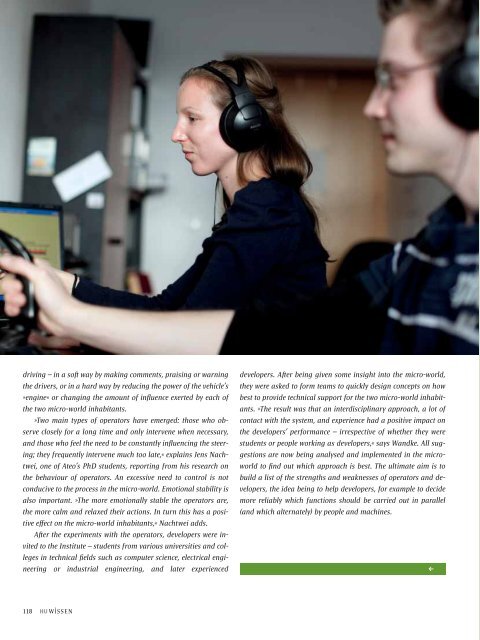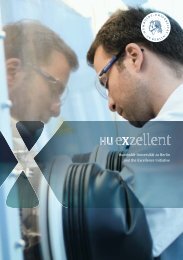hu wissen (pdf) - Exzellenzinitiative - Humboldt-Universität zu Berlin
hu wissen (pdf) - Exzellenzinitiative - Humboldt-Universität zu Berlin
hu wissen (pdf) - Exzellenzinitiative - Humboldt-Universität zu Berlin
Erfolgreiche ePaper selbst erstellen
Machen Sie aus Ihren PDF Publikationen ein blätterbares Flipbook mit unserer einzigartigen Google optimierten e-Paper Software.
driving – in a so� way by making comments, praising or warning<br />
the drivers, or in a hard way by reducing the power of the vehicle’s<br />
»engine« or changing the amount of infl uence exerted by each of<br />
the two micro-world inhabitants.<br />
»Two main types of operators have emerged: those who observe<br />
closely for a long time and only intervene when necessary,<br />
and those who feel the need to be constantly infl uencing the steering;<br />
they frequently intervene much too late,« explains Jens Nachtwei,<br />
one of Ateo’s PhD students, reporting from his research on<br />
the behaviour of operators. An excessive need to control is not<br />
conducive to the process in the micro-world. Emotional stability is<br />
also important. »The more emotionally stable the operators are,<br />
the more calm and relaxed their actions. In turn this has a positive<br />
eff ect on the micro-world inhabitants,« Nachtwei adds.<br />
A� er the experiments with the operators, developers were invited<br />
to the Institute – students from various universities and colleges<br />
in technical fi elds such as computer science, electrical engineering<br />
or industrial engineering, and later experienced<br />
118<br />
developers. A� er being given some insight into the micro-world,<br />
they were asked to form teams to quickly design concepts on how<br />
best to provide technical support for the two micro-world inhabitants.<br />
»The result was that an interdisciplinary approach, a lot of<br />
contact with the system, and experience had a positive impact on<br />
the developers’ performance – irrespective of whether they were<br />
students or people working as developers,« says Wandke. All suggestions<br />
are now being analysed and implemented in the microworld<br />
to fi nd out which approach is best. The ultimate aim is to<br />
build a list of the strengths and weaknesses of operators and developers,<br />
the idea being to help developers, for example to decide<br />
more reliably which functions should be carried out in parallel<br />
(and which alternately) by people and machines.<br />
v



